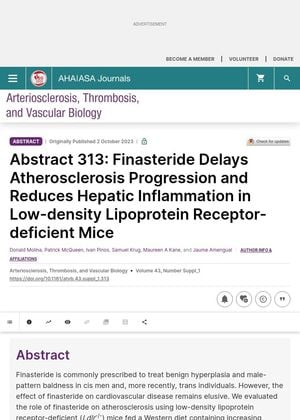Finasteride Delays Atherosclerosis Progression and Reduces Hepatic Inflammation in Low-Density Lipoprotein Receptor-Deficient Mice
May 2023
in “
Arteriosclerosis, thrombosis, and vascular biology
”

TLDR Finasteride may slow down heart disease by lowering cholesterol and reducing inflammation.
The study evaluated the impact of finasteride, a drug commonly used to treat benign hyperplasia and male-pattern baldness, on atherosclerosis in low-density lipoprotein receptor-deficient mice. The mice were fed a Western diet with increasing doses of finasteride for 12 weeks. The results showed no changes in food intake, body weight, or liver toxicity markers. However, at the highest dose, finasteride reduced plasma cholesterol and triglycerides by approximately 25% compared to the control group. It also reduced plaque content, monocytosis, monocyte recruitment to the lesion, macrophage lesion content, and necrotic area. RNA sequencing analysis showed a downregulation of inflammatory pathways and an upregulation of bile acid metabolism, oxidative phosphorylation, and cholesterol pathways in the liver of mice taking finasteride. This suggests that finasteride could potentially be used to delay cardiovascular disease due to its effects on the plasma lipid profile.





